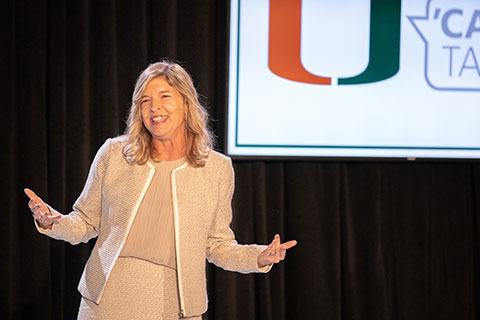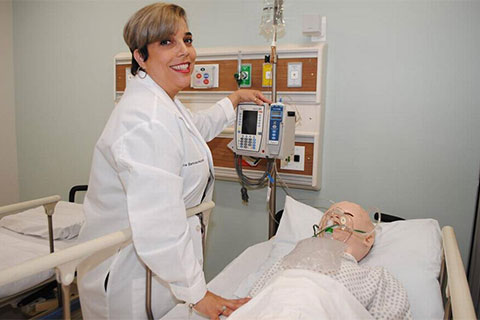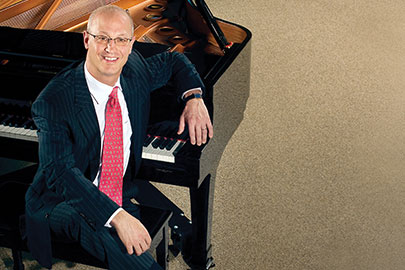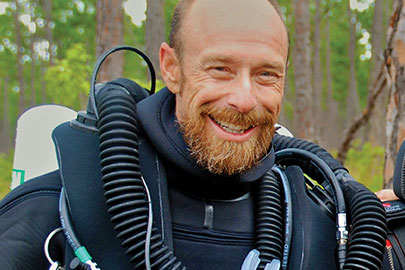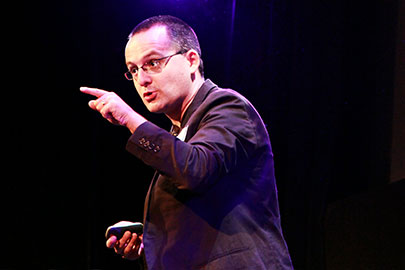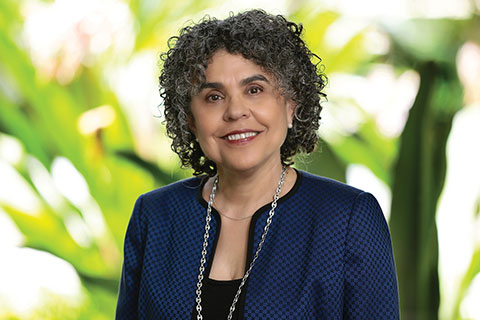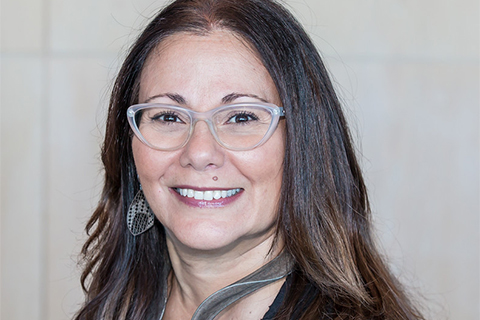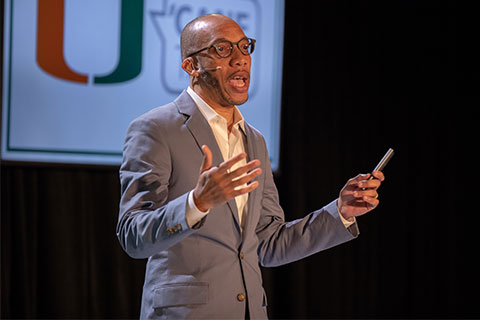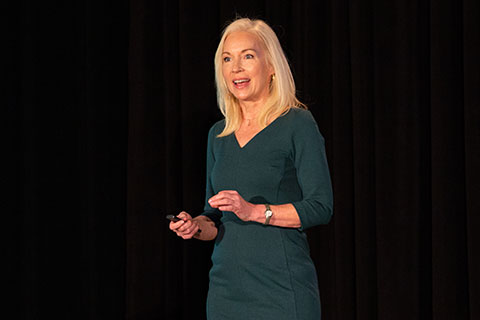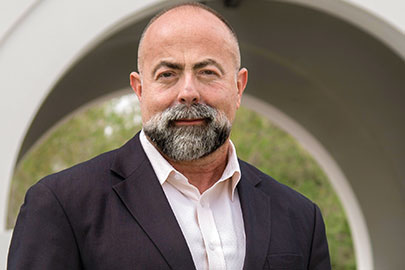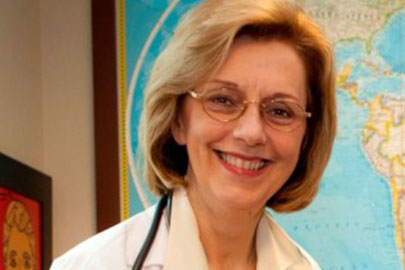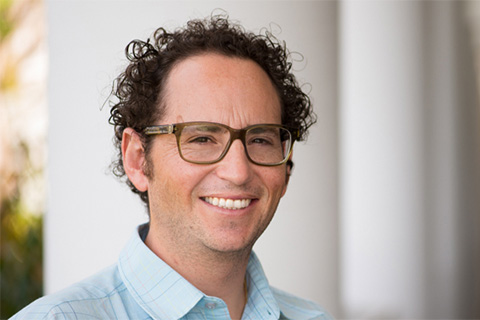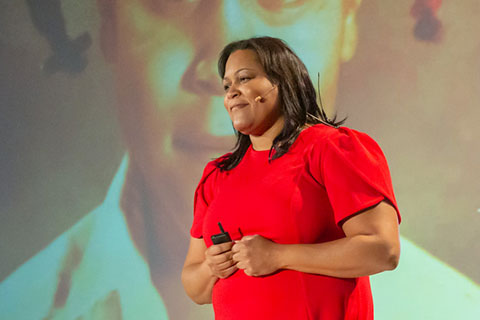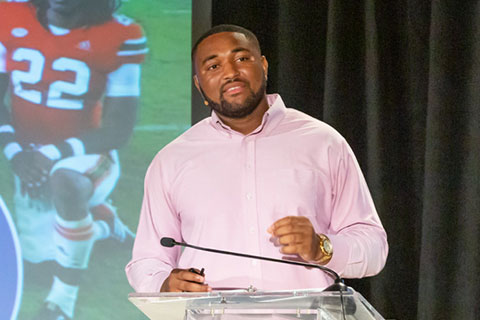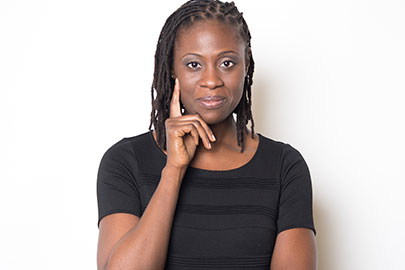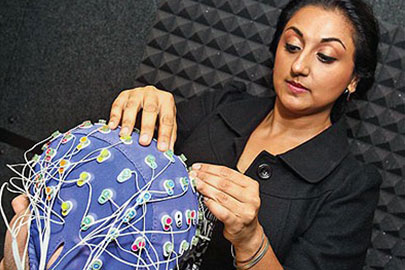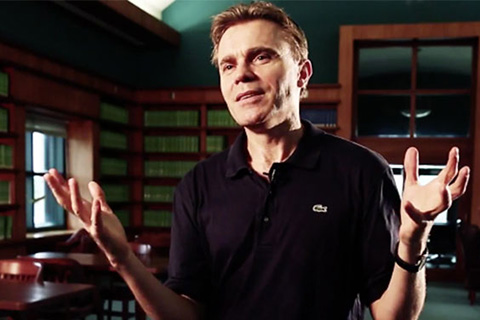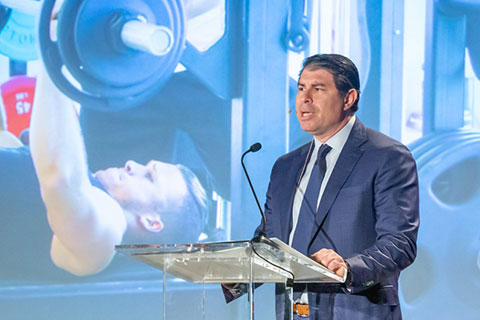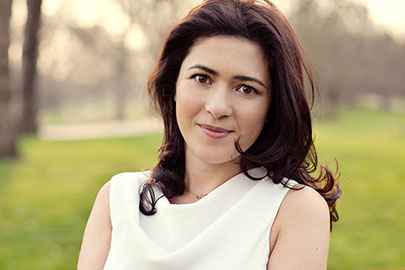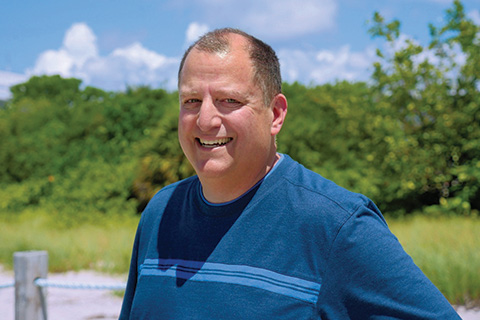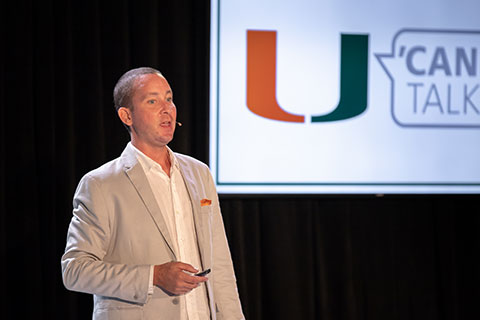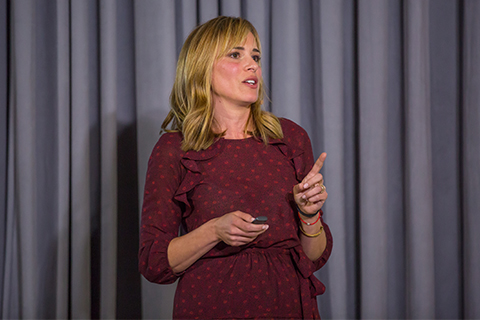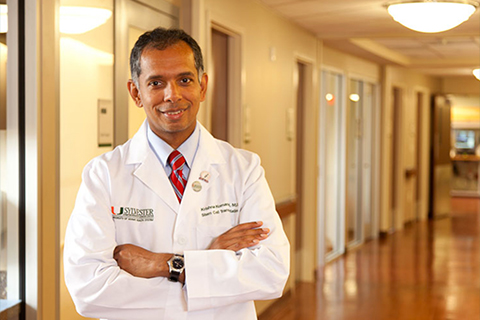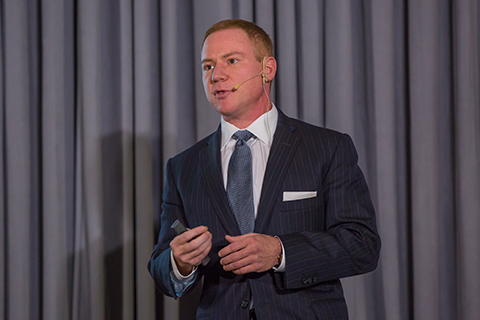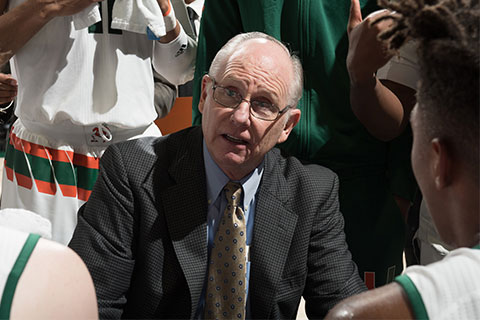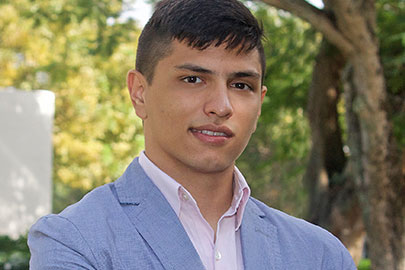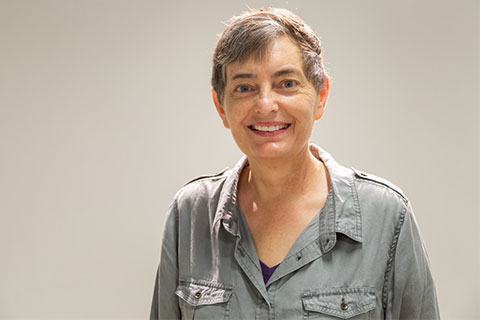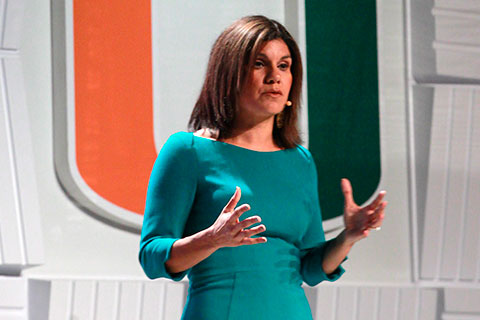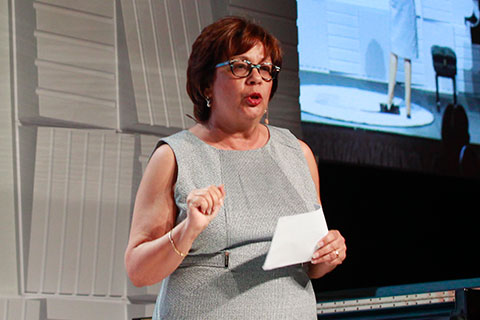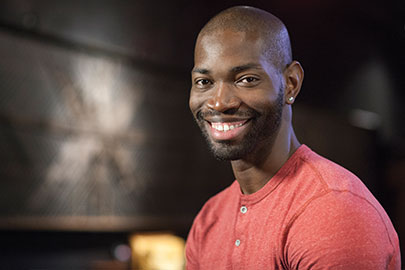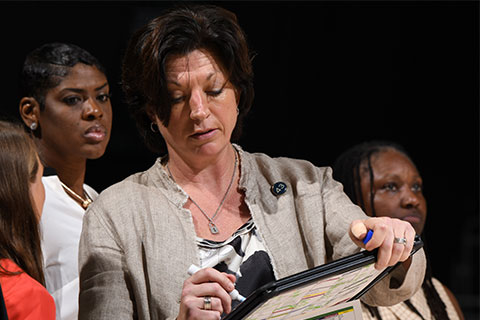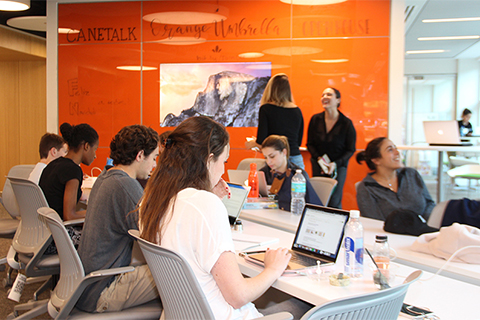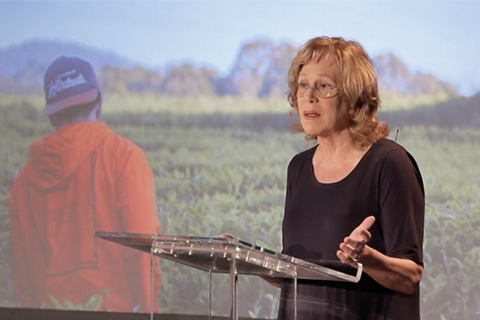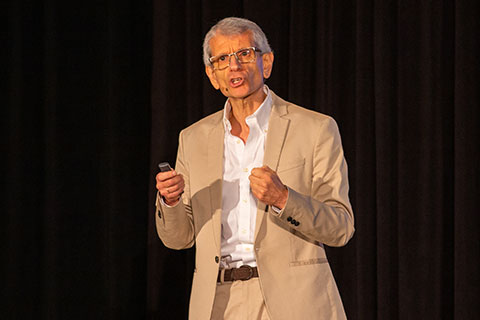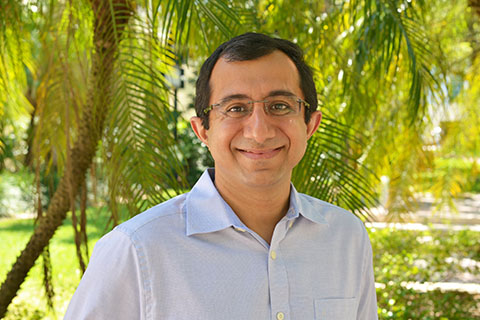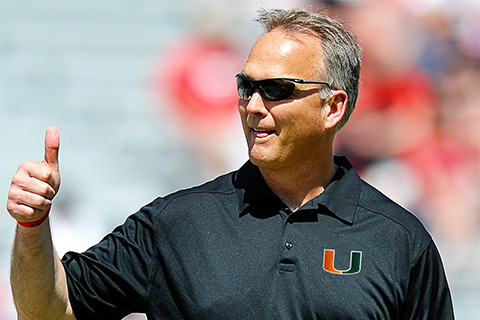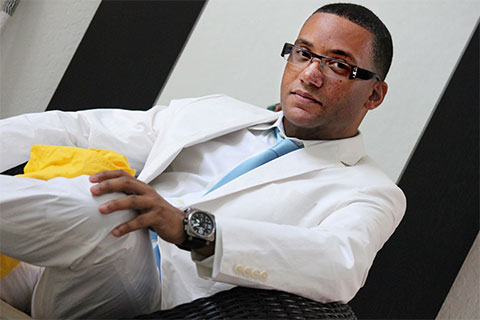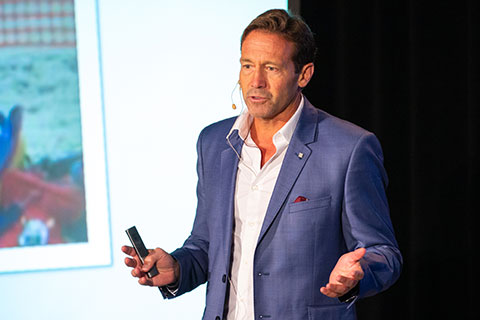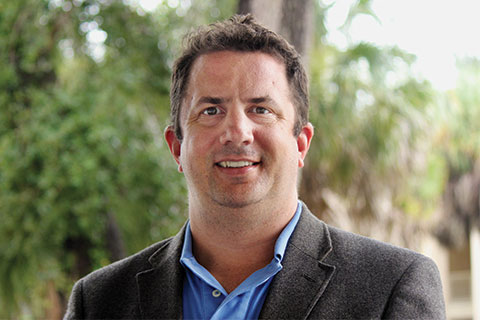Featured Links
Researchers rank Florida as one of the least civically engaged states in the nation. Studies have painted the millennial generation as less likely to vote or contact elected officials. But as the oldest members of a new generation turn 21 this year, the ground is shifting.
In the chaos of emergency rooms, environmental disasters and crises across the globe, healthcare providers make split-second decisions with lives in the balance. How do you prepare for that? Visit this new, cutting-edge Simulation Hospital and hear from Dr. Susana Barroso-Fernandez about how simulation is saving lives and preparing us for a safer tomorrow.
Dean Shelly Berg presents "Revolutionizing Music Education: The Frost School at the Forefront." Lectures might be a great way to teach people about things, but they aren’t a great way to teach people to do things. At the Frost School of Music the faculty has reinvented how musicians are prepared.
Environmental anthropologist Kenny Broad presents "Exploring the Invisible: Climate, Caves, and Culture." Beneath our feet lies one of the most inhospitable environments on earth: underwater caves. Pushing the limits of the extreme, exploring this inner space can help answer fundamental questions.
From crime statistics to public school test scores, citizens have the ability to access mountains of data on issues that impact their lives locally and globally. Alberto Cairo is the Knight Chair in Visual Journalism at the School of Communication and presents "Unlocking Information: The Power of Data Visualization for Journalists, Scientists, and the Rest of Us."
How do decision-makers in today's organizations balance the need for profits and progress while avoiding putting others at risk? Business professor Anita Cava, director of UM's Business Ethics Program, addresses how leaders can see more clearly when faced with tough decisions.
Sonia Chao and
The Center for Urban and Community Design at UM’s School of Architecture are on the front lines responding to the urgent needs of South Florida by collecting data on housing stock, creating guides for residents to explain options for protecting their homes, and working with cities and national foundations to develop new standards and guidelines for preserving South Florida’s architectural history.
In the U.S. our system of federalism allows the national government and states to have different policies on issues like minimum wage, educational testing, and government spending, among many other things. Join legal scholar Charlton Copeland to examine whether the American way of doing federalism allows people from all points of view the same leverage in policy debates that cross local and national jurisdictions.
Throughout history and across cultures, mothers have sung to their infants, suggesting that this music has an essential purpose. What are the important characteristics of mothers’ singing? How do babies respond to and benefit from this musical interaction? Music therapy professor Shannon de l’Etoile’s research examines the important role of singing in our earliest days.
Tables that tweet. Coffee cups that curate messages. Facades that fuel displays. This talk by Architecture Dean Rodolphe el-Khoury invites the audience to imagine how our built environment will be transformed by information technology.
Join one of the nation’s most prolific researchers on HIV/AIDS to learn more about the journey medical professionals have taken to treat this disease. For more than 20 years Margaret Fischl has been part of the team that built the University of Miami AIDS Clinical Research Unit.
Learn about the cutting-edge work of University of Miami Rosenstiel School research professor and shark scientist Neil Hammershlag and the team at UM’s Shark Research and Conservation Program to save the world’s sharks.
Health care providers have the power to change lives. But what if your doctor isn’t asking you the right questions? Or what if they simply don’t understand the answers that you give? A patient’s race, religion and culture can influence the treatment they receive and the decisions they make. Dr. Kysha Harriell, Associate Clinical Professor and Program Director of Athletic Training at UM explains how athletic trainers are leading the way to patient-centered care.
Listen to alumnus Demetrius Jackson’s journey from a childhood in Miami’s vibrant Overtown neighborhood to the classrooms and athletic fields of the University of Miami as he pursues a dream of playing in the NFL. Hear him reflect on major lessons he learned as a defensive end for the Miami Hurricanes and as a student of political science, and how those lessons are inspiring his next steps as an agent for change.
American public schools are a critical part of how we hope to prepare citizens for our democracy. Yet while they hold the promise for an egalitarian future, law professor Osamudia James argues in her presentation "How I Became Comfortable as That Lady: Racial Identity, Silence, and Equality in American Public Schools" that they also simultaneously entrench deep racial inequality.
Attention is necessary for everything we do—from learning, to making decisions, to regulating our mood. Yet our capacity to pay attention is limited when we are under stress. Amishi Jha, associate professor in the Department of Psychology, presents "Training the Brain to Be More Attentive: How Elite Athletes, Military Personnel, and Others Perform Better Under Stress."
Physicist Neil Johnson presents "Terrorism 15 years After 9/11: What the Rise of the Internet Can Tell Us About the Rise of ISIS." The internet has changed the way terrorists communicate and plan—and also how terrorist plots can be monitored and stopped. How can big data be harnessed to combat terrorism?
When the Miami Marlins and Miami Hurricanes play, Dr. Lee Kaplan, founder and Director of the University of Miami Sports Medicine Institute, is often on the sidelines. As an orthopedic surgeon, he has helped top athletes in tennis, baseball and football recover and compete. Learn how UM's Sports Medicine Institute convenes researchers and health care providers from across the university to advance the future of medicine and adapt lessons from the best players to help young athletes -- and all of us -- maintain an active lifestyle.
Entrepreneur, author, fashion designer, and academic Neri Karra, a member of the University of Miami Class of 1999, recounts her personal journey from a Bulgarian vineyard to a Turkish refugee camp to the University of Miami campus.
Climate modeler Ben Kirtman employs one of the world’s largest supercomputers to more accurately predict the risk of severe flooding, which has been exacerbated by sea level rise. Professor Kirtman, an advisor to the United Nations, describes what his research means for cities across the globe.
A great deal of research has been conducted on voter behavior and the demographic characteristics of people who vote. Now, new research has begun to focus on how our biology also influences political behavior. Are there aspects of our biology that determine who we are more likely to support at the ballot box? Do those influence help us make better decisions?
Dr. Erin Kobetz, Associate Director for Population Science and Cancer Disparity at the Sylvester Comprehensive Cancer Center, is a champion for collaborative work that supports underserved communities as they seek greater access to health. Her journey as a scientist was transformed by her own cancer diagnosis, which inspired innovative approaches to prevent cancer in South Florida communities from Little Haiti to local fire stations.
Thanks to advances in immunology and an ever-improving understanding of genomics and proteomics – the role genes and proteins play in disease and its progression – scientists and clinicians are able to identify unique markers present on blood cancers and modify healthy cells from our own immune system to find and destroy them. Hear from Dr. Komanduri about where the science is headed.
Nearly 100,000 people will be diagnosed with a brain tumor this year in the United States, and they will come from every age group and income bracket. The future is being rewritten for these patients by Ricardo J. Komotar, MD, the director of the University of Miami Brain Tumor Initiative, an internationally-recognized center translating research into new, minimally invasive strategies to treat and prevent brain tumors.
UM Head Men’s Basketball Coach Jim Larranaga is known for his attention to detail and his fidelity to strong systems that drive success. In this Cane Talk he unpacks his philosophy for developing a team with discipline and habit. His commitment to a clear teaching methodology helps empower his team to make a winning vision come to life. Join Coach L as he reviews game tape and reveals some of the routines he uses to develop leadership through careful preparation and execution.
UM is a global institution that reaches across the borders of geography, identity, and discipline. Mateus Lima, a member of the Class of 2017 from Brazil shares his journey to South Florida in "Choosing Not to Choose: In Praise of Life at the Intersections in Culture, Science, and Policy."
Associate Professor of Sculpture Billie Grace Lynn creates thought-provoking sculpture that addresses some of contemporary culture's most pressing issues head-on. In this ‘Cane Talk join Lynn at the Lowe Art Museum and in her studio to explore her most recent exhibition, A House Divided. The installation features a 26-foot hoodie, an 18-foot obelisk, and video of interviews with people of color that began with the question, “Do you feel safe?”
The story of Cuba can be told by tracing the ways Catholicism and African religions have been marginalized, celebrated, and transformed. Religion has left its mark on the island despite centuries of strife and persecution. Perhaps no other religious symbol characterizes Cuban religion more than La Caridad del Cobre.
Twenty years before the United States re-established diplomatic relations with Cuba, theater artists from both sides of the Florida Straits were practicing their own kind of diplomacy. Lillian Manzor, director of the University’s Cuban Digital Theater Archive, discusses the roles that theater and digital culture can play in building community in a moment and across the fraught borders of time, space and nations.
From “America’s Winter Playground” to “the Gateway of the Americas,” playwright Tarell McCraney presents "The Distant Present: A Look at Miami’s Future as a Global Artistic Gateway" and explores Miami’s distinctive mixture of worlds.
UM Women’s Head Basketball Coach Katie Meier shares her bold ideas on helping young people develop the confidence that is the foundation of leadership. Coach Katie explores how failure and challenge contribute to success at a top athletic powerhouse. Listen in as one of the nation’s best coaches shares what she believes young people, parents, teachers and coaches need to do to build strong authentic leaders.
At the University of Miami School of Communication, students are not waiting for summer or graduation to gain real-world experience. Through Orange Umbrella, a full service, student-run communication consultancy, students work in a real business with real clients. Their clientele span from within the university, to national campaigns in television and retail.
Law enforcement estimates that human trafficking enslaves 40 to 50 million people worldwide. And when they are able to escape that life, survivors need help to recover. Dr. JoNell Potter is the founder of one of the nation’s only health clinics for survivors of human trafficking and has developed a comprehensive model of care based on their unique needs. Hear stories of strength and resilience from the front lines of this epidemic and learn what each of us can do to end human slavery.
In all cultures, time zones, languages and religious beliefs, all people share a common desire to matter. Yet across the globe a range of forces are making it harder for people to matter -- challenging our ability to live and work at our peak and to achieve true health and wellness. Join community psychologist Isaac Prilleltensky for a deeper look at what it means to matter and what we need to do to help one another matter more.
Noise is a leading cause of hearing loss, yet most of us have no idea that our exposure everyday sounds -- at sporting events and concerts or from our earbuds – can be damaging our ears. Scientists at the UM College of Engineering and at Miller School of Medicine are uncovering clues about hidden hearing loss and are racing to produce solutions that can be implemented across the globe.
So much is written about coaches developing athletes, but head coaches also have a unique responsibility to develop leadership among the coaches who collectively shape a team, its strengths and its culture. Coach Richt joined us for an intimate conversation about his philosophy and strategies for shaping a team of coaches who work together to nurture the next generation of athletes.
Combining performance and personal reflection, award-winning composer and UM faculty member Gonzalo Rubalcaba presents “La Música en Mi/The Music in Me,” exploring his roots in Cuba and how his music has evolved to reflect a global complexity from the island and beyond (in Spanish).
As a lifeguard, Wes Smith spent twenty years focused on rescuing strangers. After losing his parents to disease, Dr. Smith turned his tenacity to saving lives through prevention. Learn how one initiative at the University of Miami is shifting the conversation from treatment to health through a powerful combination of education, research, student engagement and the tools to scale intervention.
A healthy democracy relies on citizens making choices based on accurate information. This is especially challenging in our age of ubiquitous social media and fake news. Political science professor Joseph Uscinski discusses what the recent presidential campaign reveals about how Americans make political choices.


